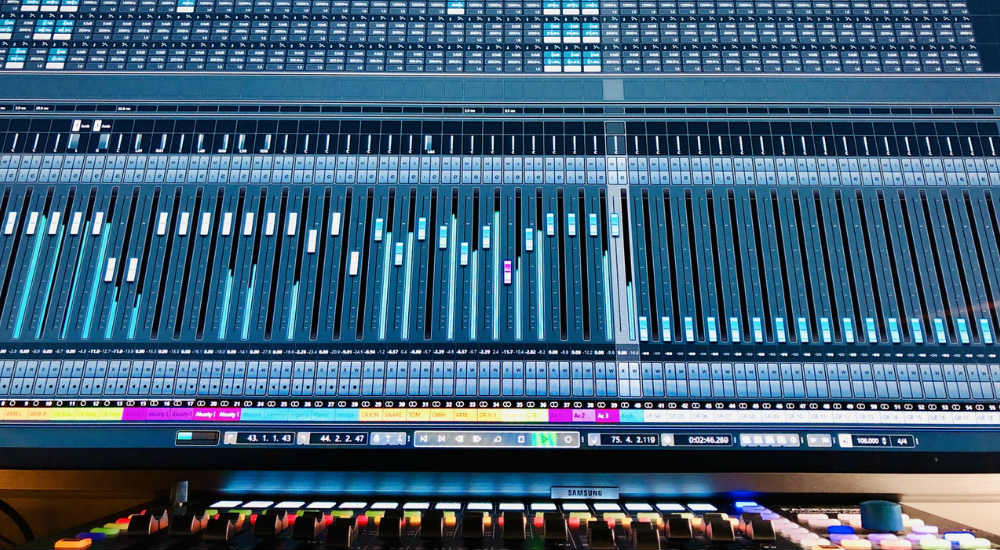In today’s age of creating music ‘in the box’, plugins are an essential addition to any music producer’s process. While they tend to vary in price, function and type, all plugins essentially use digital sound processing to emulate traditional studio tools, such as a synthesiser or a compressor, within the confines of your DAW. Plugins, or VSTs (Virtual Studio Technology) are not only the most practical (and affordable) way for home producers to access high-quality sounds and effects – they’re also favoured by a huge number of professional recording studios and audio institutions, including the students and staff at Melbourne’s own Abbey Road Institute.
“Nothing pleases engineers more than getting their hands on the gear that powers the industry,” says Alexander Braithwaite, a producer, engineer and DJ working with Abbey Road Institute. “While we’d rather have 19 LA2A’s and Urei 1176’s, the emulations from Universal Audio (UAD) are more than powerful enough to service this desire. As they journey through our advanced diploma and their skills develop, so does their appetite for powerful gear and plugins.”
Abbey Road Institute certainly provides more than enough fuel to inspire their students to push beyond the typical parameters of what being a producer entails. As well boasting the entirety of UAD’s acclaimed plugin suite, the institute plays host to many coveted pieces of studio hardware, including a jaw-dropping API 1608 console, providing students with all the tools and inspiration needed to shape their personal sonic palates.
“After the students learn the fundamentals of compression, then comes the desire to add a little something special on top. That’s where the UAD collection comes in,” Braithwaite explains. “The perfect analogue emulation helps students add classic warmth from some of the all-time best compressors. This ties in perfectly with our API 1608 room, where students can compare some hardware to the plugins to see how faithfully they match up.”
With over 90 painstakingly modeled UAD plugins at their disposal, it might be a bit tricky to know where to start behind the board at Abbey Road Institute. However, it’s fair to say that there is one jewel in the VST crown that stands out from the rest.
“Towards the end of the course, our students are ready to tackle mastering, and what better way to hone in your compression skills than on one of the biggest and baddest master compressors to exist: the Shadow Hills Master Compressor,” Braithwaite says of UAD’s formidable VST emulation. “At first glance the interface can be rather daunting, but once understood the Master Compressor is a force to be reckoned with.”
While the Shadow Hills Master Compressor is regarded by many to be one of the best compressors in the business, Braithwaite also extols the virtues of the API 2500 Compressor plugin, renowned by many for its versatility and distinctive sonic characteristics.
“[The API 2500] is one of my personal favourites for analog compression, mainly for the beautiful saturation it produces if you drive the make-up too hard,” Braithwaite reveals. “This compressor is great for students to glue their mixes together, and a great way to add distortion when desired to their productions.”
If the name didn’t give it away, Abbey Road Institute stems from an educational initiative by the world famous Abbey Road Studios in London – the very same frequented by the likes of The Beatles, Pink Floyd, Amy Winehouse and Frank Ocean. Given the world-famous quality of the outboard equipment found within the acclaimed studios, it only makes sense for Abbey Road Institute to utilise a range plugins inspired by their UK-based namesake.
“Tying in with our Abbey Road parentage, the Chandler Curve Bender is modelled on the vintage EMI TG12345 desk from Abbey Road Studios,” says Braithwaite of UAD’s flexible EQ plugin. “Teaching the students how to delicately apply EQ to a master using this unit is very rewarding, and trains them on the powers (and responsibilities) of proper EQ work with a little forgiveness from its analogue characteristics.”
Possible one of the most immediately recognisable plugins used by producers today is pitch correction: colloquially known by many as Auto-Tune. While these effects are frequently used by Kanye West and Travis Scott to create woozy, warped vocal textures, Braithwaite notes Melodyne, a popular pitch correcting plugin, is used by Abbey Road students on a day-to-day basis to add nuance and finesse to their vocal productions.
“With Melodyne, the advanced vocal tuning suite provides students with the ability to reel in wrong notes, poor vowel selection and sure up backing vocals,” Braithwaite explains, stressing just how widely pitch correction software is used within the creation of contemporary music. “Our students spend weeks looking at the intricacies of vocal production, and Melodyne is now so vital a skill that you probably won’t hear a commercial recording without it.”
Although Abbey Road Institute certainly place an emphasis on helping their students obtain a career within the music industry, many professionals can attest to the fact it’s extremely rare for an audio engineer to be a one-trick pony these days. As well as all the stock standard lessons in mic placement, compression and mixing techniques, Abbey Road Institute also ensures their students are well versed in a range of other audio tools used in radio, television and film, including automated dialogue replacement software such as Revoice Pro.
“In the film industry, lining up studio recorded ADR (automated dialogue replacement) with on-set dialogue can be an absolute nightmare. While some filmmakers shy away from ADR entirely due to this, our students are ready to take on the challenge,” Braithwaite says. “With keen ears to match takes with production sound, and Revoice doing the heavy lifting for us timing and inflection wise, we’re able to get films that sound more intelligible and powerful, regardless of how far off the sound design is initially.”
Interested in finding out more about plugins, music production and sound design? Check out the full array of courses offered by Abbey Road Institute over at abbeyroadinstitute.com.au

